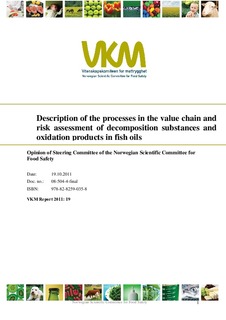Description of the processes in the value chain and risk assessment of decomposition substances and oxidation products in fish Oils. Opinion of Steering Committee of the Norwegian Scientific Committee for Food Safety
Aursand, Marit; Hamre, Kristin; Knutsen, Helle Katrine; Maage, Amund; Arukwe, Augustine; Alexander, Jan; Amlund, Heidi; Bernhoft, Aksel; Brantsæter, Anne Lise; Eriksen, Gunnar Sundstøl; Fæste, Christiane Kruse; Krogdahl, Åshild; Haugen, Margaretha; Hemre, Gro Ingunn; Lassen, Jørgen Fr; Nerland, Audun Helge; Nesse, Live Lingaas; Næss, Bjørn; Ringø, Einar; Ruus, Anders; Skåre, Janneche Utne; Steffensen, Inger-Lise; Sundheim, Leif; Sverdrup, Line Emilie; Svihus, Birger; Thomsen, Cathrine; Torrissen, Ole; Østerås, Olav; Torstensen, Bente Elisabeth; Ørnsrud, Robin; Mozuraityte, Revilija
Research report
Published version
Permanent lenke
http://hdl.handle.net/11250/2466549Utgivelsesdato
2011Metadata
Vis full innførselSamlinger
- Institutt for biologi [2575]
- Institutt for bioteknologi og matvitenskap [1574]
- Publikasjoner fra CRIStin - NTNU [38127]
Sammendrag
The Norwegian Scientific Committee for Food Safety (VKM) has been asked by the Norwegian Food Safety Authority to perform a health risk assessment on decomposition substances and oxidation products in fish oils intended for human consumption except pharmaceuticals. Seal and/or krill oil intended for human consumption might be included but in separate chapters. EU’s hygiene regulations for the production of fish oils intended for human consumption were strengthened from 2008 in the EU (from March 2010 in Norway), but concerns regarding the possible presence of decomposition substances and oxidation products in the oils and their possible consequences on human health were raised. In the request from the National Food Safety Authority, VKM was asked to include descriptions of the substances resulting from decomposition of the various raw material used for fish oil production, and the products formed during oxidation of marine oils. Additionally, a description of the substances formed and/or eliminated during the various processing steps in the production of marine oils intended for human consumption and to take raw material, processing conditions, storing and transporting conditions of raw material and fish oil into account. Depending on the detectability of the identified substances/products of concern in n-3 fatty acid food supplements, a qualitative, and if possible quantitative, health risk assessment should be performed. The main focus is on production of fish oil and on fish oil used as food supplement (i.e. in bottle or encapsulated). Other marine sources for oil production such as krill and seal blubber, as well as emulsions and microencapsulation of marine n-3 fatty acids used for fortification of regular food, are not evaluated in detail. Food supplements based on oil derived from the crustaceans Calanus finmarchicus, which is a growing business in Norway, has not been included. It was beyond the scope of this evaluation to address environmental contaminants in marine raw materials/oils and in final products.
